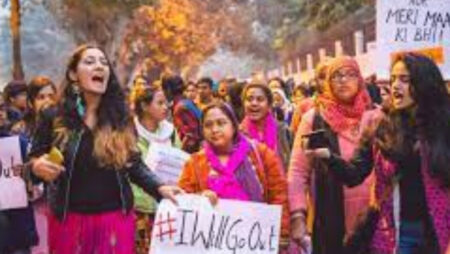What is Marital Rape?
Husband rape is when a woman is not interested but is forced to have sex with her partner.
International observation and definition, including that of the United Nations, states that if a husband engages in sexual intercourse with his wife without her consent, force or threats, it is within the scope of rape.
There are three types of husband rape—sadistic rape, including forced sex, violent sex, domestic violence, and unnatural sex.
Despite recognizing all these forms and the shocking figures released by the United Nations Population, when the government amended the Criminal Law in 2013, marital rape was not brought under the ambit of rape. According to their 2000 figures, one-third of wives in India are subjected to forced sex by their husbands.
Indian law does not even give a married woman the same treatment as a sex worker in the case of rape. Law and society consider a marriage contract as a license to forget the sexual misconduct of the husband for the rest of his life. It is not considered a criminal offence.
Marital control
The first marital control to start the violence in married life is the act of controlling when talking to other men.
Be angry or jealous when talking to other men, restricted from seeing or contacting friends, determining the relationship with husband’s family, talking to husband’s family, always trying to find out where the wife is, and trying not to be unfaithful to establishing a relationship with many.
Ask if it has been taken and show disloyalty. When any of these manifests in a partner, it becomes part of marital control, and its resentment and hostility escalate into marital rape.
Supreme Court upholds controversy
Supreme Court Chief Justice SA Bobde has observed that sexual relations between husband and wife can be called rape, no matter how cruel the husband may be. This observation of the Supreme Court has raised a lot of criticism.
One such reference is when the argument that interest and consent with women should be considered in a marital relationship remains strong, and the idea for inclusion in the category of crime is enormously advanced.
Despite the Supreme Court’s reference, the state high courts had ruled in favour of and against the atrocities against women.
Some State High Court References in this regard
Although not recognized under the penal code, Kerala High Court had ruled that marital rape could still be considered the grounds for divorce as a form of cruelty towards the wife. The Kerala High Court noted that “Treating wife’s body as something owing to husband and committing a sexual act against her will be nothing but marital rape.
The right to respect for their physical and mental integrity encompasses bodily integrity, and any disrespect or violation of bodily integrity is a violation of individual autonomy. ”
In 2018, the Gujarat High Court had ruled that non-consensual intercourse by a husband was not rape.
In 2018 the Delhi High Court observed that both men and women had a right to say “no” and that marriage did not mean consent.
Mumbai Court had ruled husband having sex with the wife against her wishes was not illegal. Chhattisgarh High Court judge NK Chandravanshi was only quoting from the law of the land when he cleared a man, accused of raping his wife, with the verdict that sexual intercourse by a man with his wife is not rape – even if it is by force or against her wish.
What can be done for Indian married women?
In India, where a woman gets raped every 16 minutes, and the likelihood of an Indian married woman suffering sexual violence is 17 times more, the need for an active interest in the legalization of marital rape is pertinent.
Even though the Justice Verma Committee and the 42nd Law Commission Report have urged criminalization of marital rape in the recent past, the only relief currently available are the civil remedies laid out under the Domestic Violence Act (DV Act) of 2005.
It is an urgent need for the judiciary to recognize marital rape as an offence under the Indian Penal Code, especially now when there is a surge in domestic and sexual violence cases against women due to the pandemic-induced lockdown.
The elimination of Exception 2 of Section 375 and the punishment for marital rape being on par with the one prescribed under Section 376 would eventually lead to the holistic development of the criminal judiciary in our country.
In 2013, a UN committee recommended that the Indian government criminalize marital rape, and followingly JS Verma committee set up in the aftermath of the Nirbhaya protests also suggested the same.
There have been many committees, many reports have come up, but the fine print remains the same. Successive governments in India have shown no will or interest, denying women’s right to their bodies after marriage.












